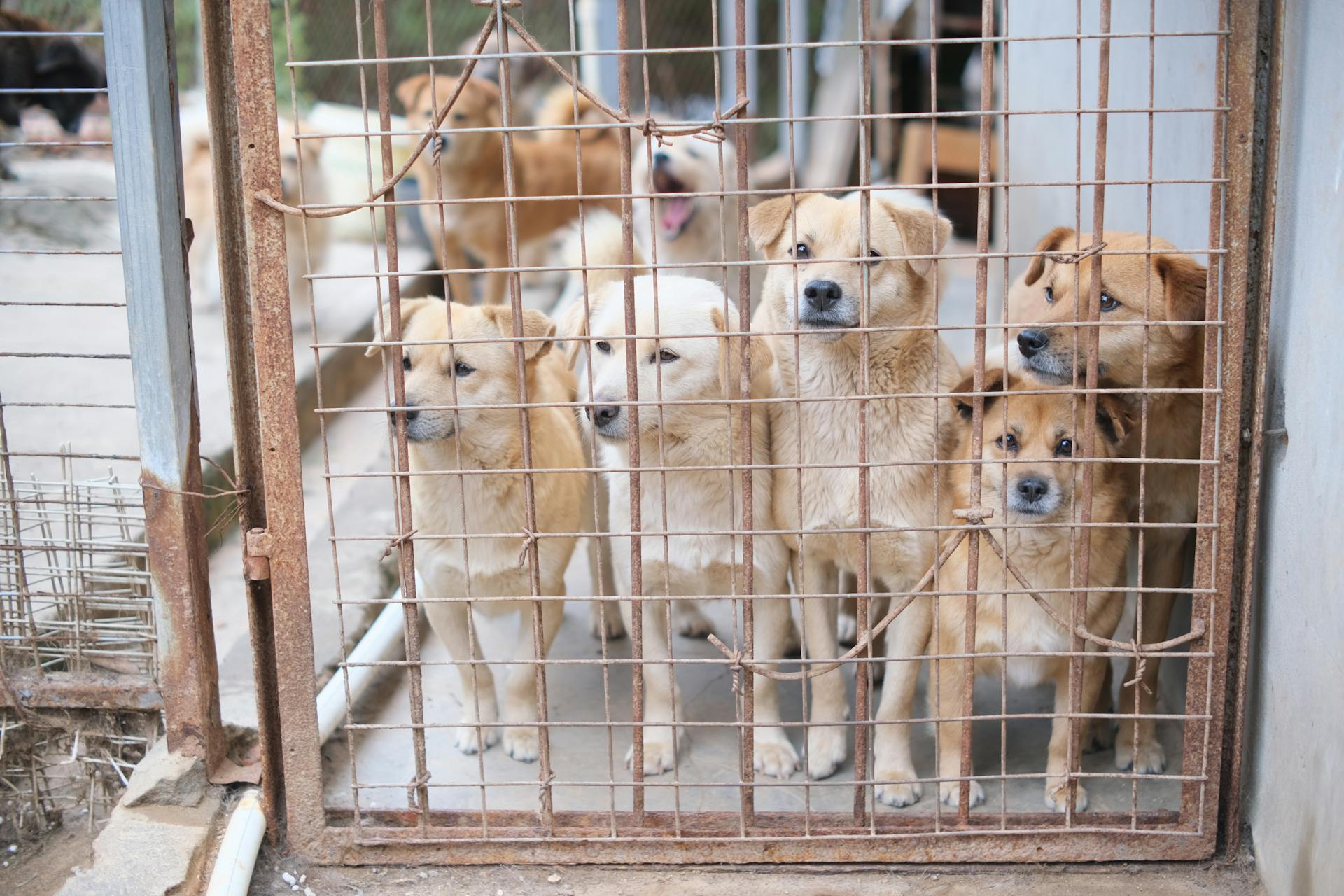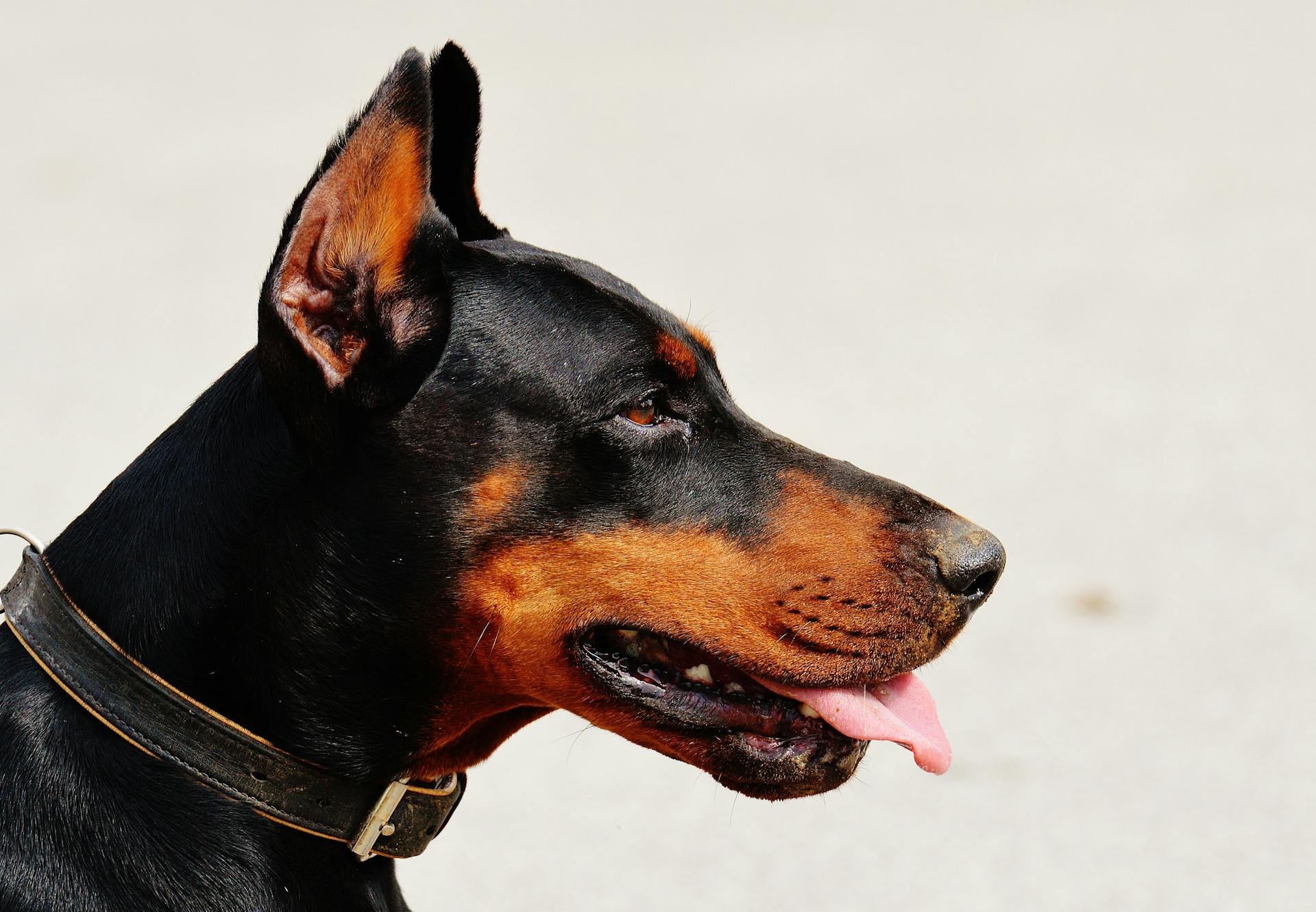
In South Africa, the pitbull dog is a breed often misunderstood and misrepresented in the media. The breed's reputation has been tainted by a few high-profile incidents of dog attacks.
The majority of pitbulls in South Africa are loving and gentle companions, owned by responsible pet owners who provide them with proper care and attention.
The breed's popularity in South Africa can be attributed to its loyalty and affectionate nature, making it a favorite among many dog enthusiasts.
South African law prohibits the ownership of pitbulls in certain areas, but this ban has been criticized for being overly broad and unfairly targeting responsible pet owners.
Take a look at this: Guard Dogs in South Africa
Pit Bull Controversy in South Africa
Pit bulls have been involved in a number of fatal attacks in South Africa, including the mauling of a five-year-old boy who died two days after being attacked by two pitbulls in the Eastern Cape.
In recent years, there have been multiple reports of vicious dog attacks on children, with some calling for a blanket ban on the breed. However, supporters of pit bulls argue that the issue lies with owners, not the breed, and are fighting against this stigma.
The Animal Matters Amendment Act, No. 42 of 1993, states that any person whose negligence causes an animal to injure another person is guilty of an offence, punishable by a fine or imprisonment of up to two years.
For another approach, see: What to Do If a Pitbull Attacks Your Dog
Scapegoating and Dangerous Laws
Pit Bulls are often scapegoated for dog attacks, but the issue lies with both the breed and irresponsible ownership. The attacks are a real problem, but a social panic can lead to overreaction and under-reaction.
Breed-specific legislation is not the solution, as it's hard to define breeds genetically. Instead, dangerous dog laws that target bad behaviour rather than bad breeds are more effective.
These laws look at the prior behaviour of the individual dog and can be tweaked to include more focus on dogs from "power breeds" or dogs over a certain size. They put the responsibility over the dog squarely with the owner.
Requiring special permits, liability insurance, and mandatory sterilisation for power breeds or dogs over a certain weight or known offenders can help reduce fatalities. Micro-chipping and keeping a database of previous offences would also mean dogs are punished for their own bad behaviour.
The state needs to vigilantly uphold anti-roaming laws in partnership with the SPCA to reduce dog bites. This can be done through private-public partnerships and education.
Educating people, especially children, about safe behaviour around dogs and good dog ownership skills can also help. This can be done through canine educational roadshows at schools, which can be a more effective approach than simply banning breeds.
A different take: Pitbull Attacks Small Dog
Are Naturally Aggressive?
The debate about pit bulls being naturally aggressive is a complex one. According to the Pit Bull Federation of South Africa, American pitbull terriers are the most misunderstood breed in the world.
Historically, pit bulls were bred for bull-baiting in England and later imported to South Africa in the 1970s, where they were bred as guard dogs and for illegal dog-fighting rings. Their training is often derelict or intentionally aggression-inducing.
Pit bulls have also been bred to have high pain thresholds, which can make them more resilient to physical punishment. Their behaviour is perhaps 60% genetic, but dog behaviour is flexible and can be drastically modified by training and experience, especially between three and 12 weeks.
The dogs were not originally bred to be human-aggressive, but rather "dog-aggressive". This means that with proper training and socialization, a pit bull can be a loving and gentle companion.
Explore further: Pit Bulls Behavior
The Controversy
Pit Bull advocates argue that the breed is often misunderstood and unfairly stigmatized. They claim that if a Pit Bull displays aggression towards a human, it's primarily a result of irresponsible ownership and mistreatment, rather than an inherent characteristic of the breed.
The Pit Bull Federation of South Africa (PBFSA) educates about the breed and works to protect and promote Pit Bulls. They aim to dispel misconceptions and foster an understanding of Pit Bulls in South Africa.
Irresponsible breeding practices and mistreatment of Pit Bulls are major concerns. Backyard breeders create aggressive crossbreeds and sell them to inexperienced owners, which can lead to attacks.
Responsible breeding practices, education, and promoting responsible ownership are key to addressing concerns related to the breed. This includes understanding the specific dog and how to secure it at home and in public.
Pit Bull owners should take full accountability for their own negligence and mobilize to become better handlers. This includes getting their dogs assessed by the SPCA or a qualified dog behaviourist if they have concerns.
The PBFSA promotes responsible ownership by advocating for proper training, socialization, and spaying/neutering of Pit Bulls. This can help prevent attacks and reduce the risk of harm to humans and animals.
Ultimately, the controversy surrounding Pit Bulls in South Africa highlights the need for education, awareness, and responsible ownership. By working together, we can create a safer and more informed community for all.
Recommended read: Blue Pittie
Pit Bull Attacks and Safety
Pit bulls have a high pain threshold, which can make them more aggressive.
Their training is often derelict or intentionally aggression-inducing, which can contribute to their aggressive behavior.
Breed specific legislation ignores behavioral and biological aspects, making it ineffective in addressing the root causes of aggression.
Aggressive pit bulls are more likely to be male, intact, and unsocialized or encouraged in aggression.
In South Africa, a number of pit bull attacks have resulted in fatalities and serious injuries, including the deaths of a five-year-old boy, an 88-year-old woman, a three-year-old boy, and a 15-month-old toddler.
The Animal Matters Amendment Act states that any person whose negligence causes an animal to injure another person is guilty of an offence, with a penalty of a fine or imprisonment of up to two years.
For more insights, see: Pitbull Dog 6 Months Old
Responsibilities and Rights
As a responsible dog owner, it's crucial to understand the importance of sterilisation and proper care, training, and socialisation of your pitbull.
The Pit Bull Federation of South Africa (PBFSA) encourages sterilisation and strongly opposes the breeding of unregistered pitbull terriers.
Proper care and training can make a huge difference in raising well-behaved, well-adjusted dogs that can live happily and safely with their families and the community.
The National Council of Societies for the Prevention of Cruelty to Animals says owners are responsible for researching and understanding the type of animal they own.
If you're attacked and injured by a pitbull, you have the right to claim compensation from the owner, which usually covers medical costs, loss of earnings, and general damages for pain and suffering.
Dog bite claims in South Africa are covered by the principle of strict liability, meaning the dog's owner is legally responsible for the damage or loss caused by the dog.
Judges can enforce the legal maxim "actio de pauperie", which holds the owner liable for damage caused by their dog in certain circumstances.
To challenge this ruling, an owner must prove the dog was provoked or was defending itself from abuse.
Consider reading: Pitbull Dog Bite Owner
Addressing the Problem
Breaking dog fighting rings is crucial to eliminating the problem of aggressive pitbulls. The Hawks, South Africa's priority crime division, need to work closely with the SPCA to crack down on these rings.
Once dog fighting is stopped, there will be less incentive to breed for aggression, and more money in breeding pitbull lines that are family friendly. Breeding strictly with behavioural testing against aggression will help.
Historically, there's no evidence to suggest that banning a specific "aggressive" breed eradicates the problem. Legislation is almost impossible to enforce fairly and a banned breed can simply be renamed or go underground.
The government is working on a way to identify short-, medium and long-term approaches to promote people's safety. A joint task team is planning a comprehensive DNA analysis of pitbull and pitbull-type dogs to assist with the identification of problem animals.
The old English bulldog, originally from fighting stock, is now famously gentle and a family pet. This shows that with the right breeding and training, even aggressive breeds can become loving companions.
On a similar theme: American Pitbull Terrier Temperament Aggressive
South Africa's Pit Bull Issues
South Africa has seen a number of pitbull attacks in recent years, resulting in fatalities and serious injuries.
In April, a five-year-old boy died after being mauled by two pitbulls in the Eastern Cape, and in March, an 88-year-old woman was mauled to death by a neighbour's two pitbulls in Cape Town.
The cases have sparked a conversation about possible bans on owning certain dog breeds, with a petition receiving over 100,000 signatures.
Our laws are quite clear on the responsibility of animal ownership, with the Animal Matters Amendment Act stating that "any person whose negligence causes an animal to injure another person is guilty of an offence."
The penalty can be either a fine or imprisonment of up to two years, and it's essential for dog owners to understand their breed, especially working dogs like pitbulls.
Pitbull ownership has been on the rise, with about one in five dogs in the USA being identified as a pit bull terrier, and statistically, most dog bite incidents are then pit bull related.
For your interest: Old Pitbull Dog
South Africa's Problems
South Africans are justified in their calls for stricter laws around dog ownership, with three incidents involving pit bulls in November alone, including one that killed a 15-month-old child.
The Animal Matters Amendment Act, No. 42 of 1993, is quite clear on the responsibility of animal ownership, stating that any person whose negligence causes an animal to injure another person is guilty of an offence.
Public sentiment is not on the side of the pit bull breed, with a petition receiving over 100,000 signatures calling for a blanket ban on the breed.
Pit bulls are working dogs that need a lot of training and stimulation to keep them sociable, according to Jenny Minne, Director of Bully Assure.
The Pit Bull Federation of South Africa (PBFSA) educates about the breed and works to protect and promote Pit Bulls, but their efforts are hindered by misconceptions and stigma surrounding the breed.
South Africans are divided on the issue, with some calling for a ban on pit bull ownership and others advocating for stricter regulations to protect people and animals from dog attacks.
Discover more: Grey Pit Bulls
Additional Options
In South Africa, addressing the pit bull issue requires a multi-faceted approach.
The Hawks, South Africa's priority crime division, need to break the illegal dog fighting rings, working closely with the SPCA.
By stopping dog fighting, there will be less incentive to breed for aggression, allowing for more money to be invested in breeding family-friendly pit bull lines.
Breeding strictly with behavioural testing against aggression will help to reduce aggression in pit bulls.
Other breeds, like the old English bull dog, also descend from fighting stock, but cracking down on their fighting led to a decrease in aggression.
The genetic material for friendly, gentler pit bulls already exists, with some breeders focusing on these lines.
A different take: South American Dogs
Frequently Asked Questions
How much is a pitbull dog in South Africa?
In South Africa, a pitbull dog typically costs between R1,900 and R2,000. However, their sale price is not the only reason behind the controversy surrounding these dogs.
How much do you get when you report a pitbull in South Africa?
In South Africa, there is no reward for reporting pit bulls, as messages claiming a R1 500 reward are scams.
Sources
- https://theconversation.com/pit-bull-attacks-in-south-africa-a-historian-sheds-light-on-the-issues-195666
- https://www.downtoearth.org.in/blog/wildlife-biodiversity/pit-bull-attacks-in-south-africa-a-historian-sheds-light-on-the-issues-86317
- https://www.dsclaw.co.za/articles/pitbulls-in-sa/
- https://explain.co.za/2022/11/24/does-south-africa-have-a-pit-bull-problem/
- https://www.sapeople.com/animals/are-pit-bulls-banned-as-pets-in-south-africa/
Featured Images: pexels.com


